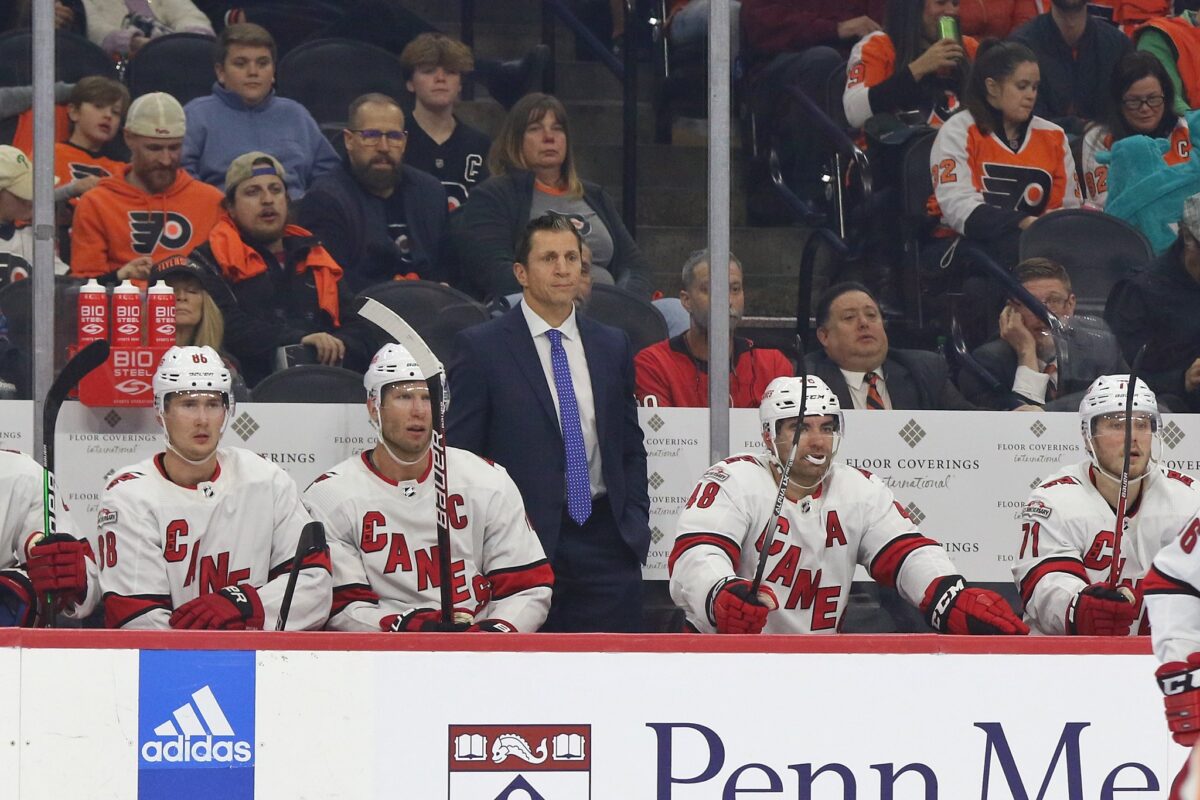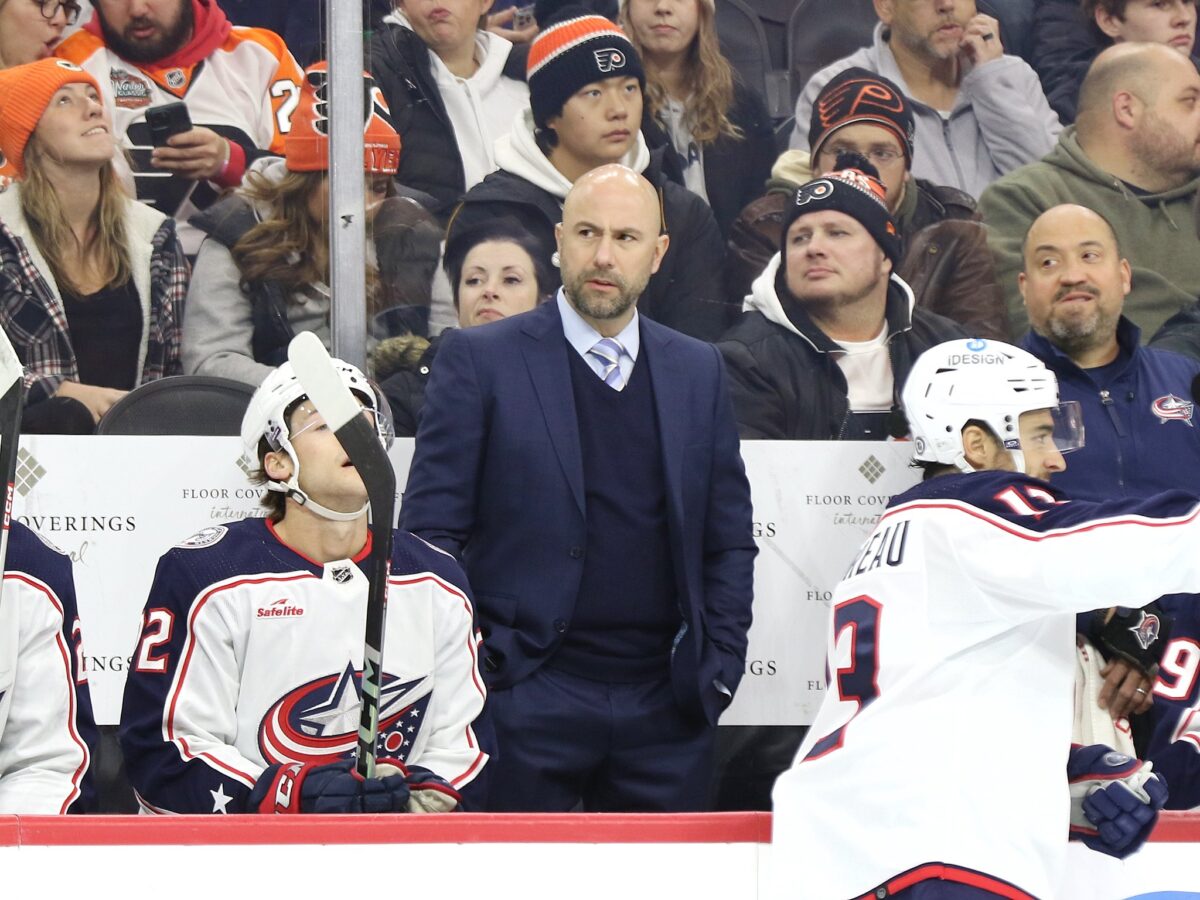With the recent announcement of Pascal Vincent‘s promotion from assistant coach to head coach with the Blue Jackets, we’ll look at the path he’s taken to where he currently sits. Is there a history of internal promotions recently within the NHL? And if so, how have some recent coaches done since being promoted?
Similar Trajectory
There are actually quite a few former assistants, who were named head coach with the same team and are currently still in that role. The Carolina Hurricanes, Minnesota Wild and Buffalo Sabres all hired head coaches who had previously served as their assistant coaches. These head coaches are Rod Brind’Amour, Dean Evason and Don Granato. Let’s examine their paths and how they’ve fared since taking over the helm.
Brind’Amour was promoted to head coach ahead of the 2018-19 season after serving as an assistant with Carolina for the previous seven years. Brind’Amour was a well-known NHL player, widely respected for his leadership and team-first mentality with Carolina. He served as team captain for the Hurricanes when they won their first and only Stanley Cup in 2006. Hiring Brind’Amour made sense back in 2018 and has paid dividends since. Carolina amassed a 226-107-37 record over this time period while making the playoffs in each season. In 2019 and 2023, the Hurricanes lost in the Eastern Conference Final, one round short of the Stanley Cup Final. Lastly, Brind’Amour was named the Jack Adams Award winner following the 2020-21 season, awarded annually to the league’s top coach. He is entering his sixth season as head coach.

Evason was named head coach of the Wild at the tail end of the 2019-20 season. Prior to that, he had been an assistant with the team since 2018-19. Since taking over head coach duties, the Wild have put up a record of 142-67-23 over the last three (and a little more) seasons, making the playoffs each year. Ironically, Evason was also a finalist for the Jack Adams Award in 2020-21 before being beat out by Brind’Amour. Evason is now leading the Wild into his fourth full season as their head coach.
Granato took over as head coach in Buffalo after spending about one and a half seasons as an assistant coach with the Sabres. He was named bench boss in March 2021 with another 28 games to go in the 56-game COVID-shortened regular season. Since assuming head coaching duties, the Sabres have put together a record of 83-88-21 in roughly two and a half seasons. Although the Sabres have yet to make the playoffs in Granato’s time, they missed the wild card spot by one point last year. Their future is bright as they head into Granato’s third full season as head coach.
All in all, these three recent assistants turned head coaches have done very well upon taking over the team. While none of these teams have won a Stanley Cup, only one team can claim that right each season. Putting together multiple playoff appearances, and/or winning records shows that the team is on an upward trajectory. All three of these head coaches have accomplished that in their tenures thus far.
Potential Reasons Why
So why have internal assistants promoted to the head coaching role performed well in their time so far? While there are many reasons, some likely are not visible from an outsider’s perspective, we’ll take a look at some that are more visible.
First and foremost, all of these coaches will have familiarity with the organization from working there already. Serving as an assistant under the same GM, owner, etc. allows for a smooth transition where the “new” head coach already has a deep understanding of the way the organization operates from the top level, down.
Related: Blue Jackets Would Benefit From Potential AHL Exemptions for 2 Prospects
Second, these coaches have already built trust with the players over their time as an assistant. There is no “feeling out” period where the new head coach has to take his time to learn each player’s tendencies and find out the best way to relate to them. All these aforementioned coaches had spent multiple years with the organization, building relationships with their players over that time period.
These two pieces, familiarity and trust, allow the new head coach to progress up the learning curve quicker. There is little to no time spent getting accustomed to the way things are done, allowing the head coach to dive right into on-ice and team responsibilities. This undoubtedly plays a big factor in why these coaches have been able to succeed in their first few years as new head coaches. It is also something that can be overlooked at times when hiring external candidates.
What This Means for Vincent
Vincent spent the last two seasons as an assistant, or associate, coach with the Blue Jackets. Before that, he was head coach in the American Hockey League (AHL) with the Manitoba Moose for five seasons and also served as an assistant with the Winnipeg Jets for five seasons. Vincent has spent time honing his craft as both a head coach at the AHL level and an assistant at the NHL level. He now dives into his first NHL head coaching gig at the age of 52.
For Vincent, he should experience the same benefits with familiarity and trust that Brind’Amour, Evason, Granato and others have as well. He has worked with the team and their players for two full seasons, including time spent with younger prospects between the NHL draft and rookie/training camps. There is no one with a closer relationship to the players than Vincent, and that would be true even if he had stayed in an associate role this season.

Vincent should be able to leverage his relationship with the players to create buy-in and belief amongst the team. He does not have a ton of time to get the team organized and ready to play as pre-season games are already underway. But as we’ve discussed, with an internal coach like Vincent, there is no “feeling out” period and he can jump right in and get to work. He is now able to focus on the on-ice responsibilities ahead of him and will likely get up the learning curve quicker as a result.
The Blue Jackets head to St. Louis to take on the Blues in their next pre-season game Tuesday, September 26th at 8:00 PM EST. For their full pre-season schedule, click here.
